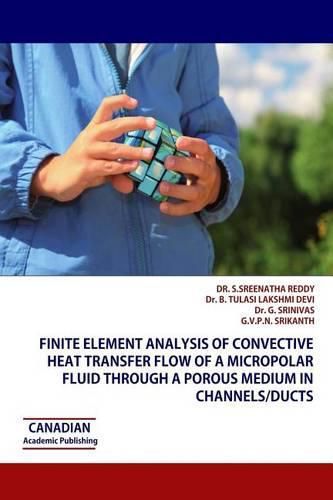Readings Newsletter
Become a Readings Member to make your shopping experience even easier.
Sign in or sign up for free!
You’re not far away from qualifying for FREE standard shipping within Australia
You’ve qualified for FREE standard shipping within Australia
The cart is loading…






The study of buoyancy driver convection flows through porous media has been stimulated by its application in several geophysical and engineering problems.Interests in understanding the connection transportation in porous material is increasing owing to the development of geothermal energy technology, high performance insulation for building and cold storage drying technology and many other areas. The theory of micro fluids, as developed by Eringen [6] has been a field of active research for the last few decades as this class of fluids represents mathematically many industrially important fluids like paints, blood, body fluids, polymers, colloidal fluids and suspension fluids. In this material points in a volume element can undergo motions about centers of mass along with deformation. The problem of simple micro fluid contains a system of 19 equations with 19 unknowns so that it becomes difficult to find solution. A subclass of thee fluids introduced by Erignen [7], is the micro polar fluids, which exhibit the micro rotational effects and micro rotational inertia under these assumptions deformation of the fluid microelements is ignored: nevertheless micro rotational effects are still present and surface and body couples are permitted. Here in the skew symmetric property of the gyration tensor is imposed mathematically in addition to a condition of micro isotropy, so that the system of 19 equations reduces to seven equations in seven unknowns.
$9.00 standard shipping within Australia
FREE standard shipping within Australia for orders over $100.00
Express & International shipping calculated at checkout
The study of buoyancy driver convection flows through porous media has been stimulated by its application in several geophysical and engineering problems.Interests in understanding the connection transportation in porous material is increasing owing to the development of geothermal energy technology, high performance insulation for building and cold storage drying technology and many other areas. The theory of micro fluids, as developed by Eringen [6] has been a field of active research for the last few decades as this class of fluids represents mathematically many industrially important fluids like paints, blood, body fluids, polymers, colloidal fluids and suspension fluids. In this material points in a volume element can undergo motions about centers of mass along with deformation. The problem of simple micro fluid contains a system of 19 equations with 19 unknowns so that it becomes difficult to find solution. A subclass of thee fluids introduced by Erignen [7], is the micro polar fluids, which exhibit the micro rotational effects and micro rotational inertia under these assumptions deformation of the fluid microelements is ignored: nevertheless micro rotational effects are still present and surface and body couples are permitted. Here in the skew symmetric property of the gyration tensor is imposed mathematically in addition to a condition of micro isotropy, so that the system of 19 equations reduces to seven equations in seven unknowns.